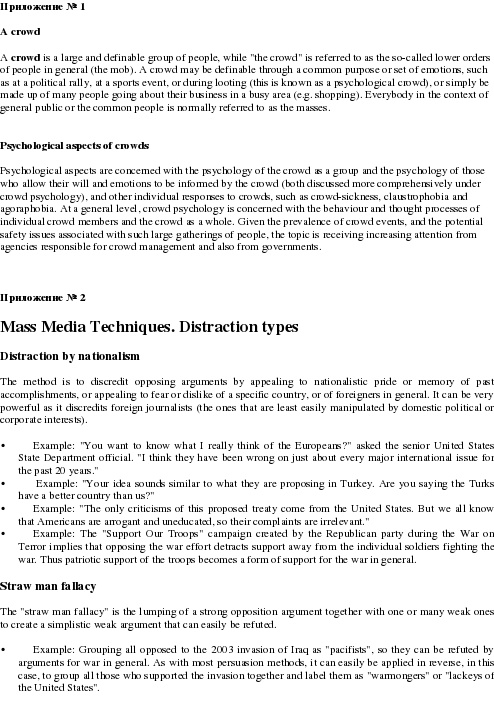| Этапы задания | Задачи данного этапа | Методы и приемы | Речь педагога |
| I. Вступительная часть. |
| 1. Приветствие. Создание коллаборативной среды.
| Начало общения, привлечение внимания, вступление в контакт | Словесный метод | - Good morning, dear boys and girls! - I am glad to see you!
|
| 2. Brainstorming activities. Modern life isn’t impossible without information. Is that true? How do you obtain information? What is Mass Media? What is Mass Media associated with
3. Речевая зарядка (Video “Crowd Psychology Manipulation 1 of 24”.)
| Удержание внимания, включение памяти, настрой на иностранный язык, создание иноязычной атмосферы, развитие умений аудирования.
Совершенствование лексических, грамматических навыков.
| Словесный метод. Метод звуковой наглядности.
Создание условий для определения "знаю-хочу знать" по теме для осознания целей урока.
|
P1. Yes, it’s true. Modern life. Isn’t impossible without information. P2. We obtain information at school, by watching TV, listening to the radio, reading newspapers, from Internet. P3. Mass Media is the way of giving and getting… P4. Mass Media is associated with «The TV», «The Press», «The Radio», «The Internet»
- Let’s begin with the video. First of all watch it please. - (After watching) What is this video about? What is the main topic of this video? (Crowd Manipulation). Do you want to learn something new about it? - Ok, let’s start!
- Today we'll speak about the role of the media and its manipulation. - Are you ready? Let’s start!
|
|
|
|
|
|
| II. Основная часть |
| 1 Введение новых терминов «manipulation», «mass-media manipulation». (Подобрать как можно больше слов ассоциирующихся с выше названными терминами, далее постараться дать определения)
| Развитие умений говорения, совершенствование лексических и грамматических навыков. Развитие памяти, внимания.
| Наглядный метод, метод создания проблемной ситуации, метод игры, словесный метод.
антиципация (предположение), зигзаг (обмен мнениями внутри всей группы) | - Now I want to suggest you very interesting task as the “brainstorm”. - What words can you name connected with the word “manipulation”? (behavior, people, crowd, effects, influence, propaganda, mood, type, aims, change, social, perception, …) - Can you tell me now what manipulation is? (Manipulation is a type of social influence that aims to change the perception or behavior of others through underhanded, deceptive, or even abusive tactics). - What’s about «mass-media manipulation»? What is it? What is it connected with? (TV, radio, newspapers, consumer, society, crowd, influence, change, propaganda, news, the Internet, the masses, …) - Now we can give the definition to the «mass-media manipulation». Can you? (Media manipulation is an aspect of public relations in which people create an image or argument that is in their particular interests, and which helps them to achieve some particular aims)
- I’m so pleased with your work! Thanks a lot! |
| 2. Введение и закрепление нового термина «psychological crowd». Чтение мини-текстов, определение понятия «психологическая толпа», и ее признаков. (Приложение № 1)
| Совершенствование лексических навыков, формирование навыков чтения. Развитие памяти, внимания. | Наглядный метод, словесный метод. Метод совместного поиска истины.
ИНСЕРТ (чтение текста с пометками)
| - The next task is the following: I'll give lists of paper with the task. - First of all you should read the texts and decide what are the «psychological crowd» and its features.(особенности)
- Well-done! Thank you!
|
| 3. Динамическая пауза. |
| 3. Advantages and Disadvantages of the Mass Media. На доске размещены различные картинки по теме «СМИ», каждый ученик подходит к доске и складывая в корзину ту или иную картинку, называет плюсы и минусы «СМИ». Работа с интерактивной доской SmartBoard
| Развитие аудирования, совершенствование грамматических и лексических навыков. | Метод наглядности. Словесный метод. Динамическое упражнение.
| - I think that you are tired a bit, let’s relax! You see different pictures connected with the mass-media, your task is to decide what are the advantages and disadvantages of the mass media and then to pull one picture to the basket naming it. Let’s start! You are welcome!
|
| 4. Введение нового материала «Манипулятивный арсенал СМИ» и «Приемы манипуляций в СМИ» (Mass Media Techniques). Проводится конференция. Каждой команде предлагается материал по теме для анализа и частичной выборки наиболее важной информации для дальнейшего обсуждения и ответа на вопросы, а также составить по 3-4 вопроса каждой команде.
| Совершенствование навыков чтения. Развитие лексических навыков и умений. Совершенствование умений задавать вопросы. Обсуждение. Развитие внимания, памяти, мышления.
Why do we need for the newspaper? | Словесный метод. Метод монологического высказывания. Метод обсуждения. Метод проблемной ситуации.
Карусель (обмен полученной информацией)
Приём «Fishbon» | - Now you are relaxed and we can continue our lesson. - Now we are going to take part in the international conference on the Media Techniques. I want you to divide into 2 groups. - Ok. Thank you. - You will receive the texts with the information on this topic. Your task will be to read the text, mark the techniques, formulate the main features of the techniques, and then be ready to discuss and answer the questions, then you will be to make 3-4 questions on this topic. - You have 10 minutes. Ok! You may start… - My dear, your time is up! Let’s discuss! But…→
- It sounds lovely. Good work.
|
| 5. Учитель предлагает учащимся составить синквейн. Обучающиеся работают в группе, обсуждают и составляют монологическое высказывание по теме.
| Развитие умений делать обобщения, делать выводы. Развитие способностей анализа информации. | Прием «Синквейн» (составление монологического высказывания) | - What are we talking today about? Let’s speak about the Role of the Mass Media and the Mass Media Techniques. - Give me 2 adjectives characterizing it. - Now give 3 verbs or participles you can use talking about it. - Give me 4 words or one sentence, describing feelings or emotions when you look at the Pyramid. - Give me only one word to summarize all ideas about the described object. - So you may use it as a plan and talk about the Role of the Mass Media and the Mass Media Techniques. Please, discuss it in the groups.
|
| III. Заключительная часть. Рефлексия. |
| 1. Домашнее задание, его объяснение.
| Объяснение домашнего задания, создание мотивационной базы для следующего занятия. | Словесный метод. |
- Thanks for all the pupils! Today we have done a very hard work and now your home task. Imagine that you are a scientist and you have to write an abstract on the topic «The Role of the Mass Media. The Mass Media Techniques».
|
| 2. Подведение итогов занятия, оценивание работы наиболее активных учащихся.
| Создание мотивационной базы для новой встречи, анализ проделанной работы. | Словесный метод | - Pupils, did you like the lesson? Was it interesting for you? - Now I’ll give you marks.
|
|
3..Рефлексия
|
|
|
- Thank you for the lesson! The lesson is over! See you tomorrow! Good-buy!
|
A combination in which your weakest opponent (or easiest to discredit) is considered as your only important opponent.
A risky but effective strategy summarized best, by which the public can be distracted, for long periods of time, from an important issue, by one which occupies more news time. When the strategy works, you have a war or other media event taking attention away from misbehaving or crooked leaders. When the strategy does not work, the leader's misbehavior remains in the press, and the war is derided as an attempted distraction.
This involves using euphemistically pleasing terms to obscure the truth. For example saying "reproductive rights", "pro-choice", or "pro-life" instead of referring to the medical term "abortion". The concept of "states' rights" was invoked to defend the continuation of slavery in the United States on the eve of the American Civil War, and again to fight against the civil rights movement in the 1950s and 1960s. The work of Frank Luntz is a notable example when focus groups are convened and the favorable or unfavorable characterizations are used in the selection of special code wording. The more favorable characterization of politicized concepts is thus chosen for future political campaign repetition.
This method uses the previous state of the opponent propaganda to prevent the negotiation of actual issues.
This method injects false issues into the opponent's propaganda or attempts to create connections with falsities. Repetition of falsehoods from numerous outlets, nearly simultaneously, is one of the most effective means to mislead by distraction.
This method tries to create a connection between an opponent's propaganda and horrific events. (For example when a minority is being arrested by the police and one attempts to create a connection with past unjust actions).

















